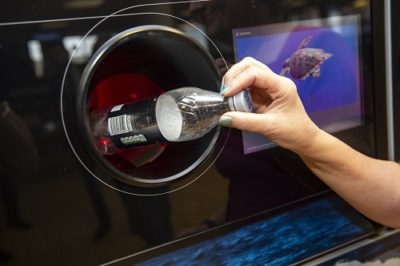A survey carried out by Recoup has found that 20% of participants would not be willing to travel to return their drinks containers as part of a deposit return scheme.
The result was part of consumer insight research by plastics recycling charity Recoup which involved 341 people.
Respondents were interviewed in three main locations about how they would use a deposit return scheme for packaging.
Travel
Out of the remaining participants, 36% of consumers would only travel less than a mile to return drinks containers to get their deposit back, with only 14% being prepared to travel more than 3 miles.
According to Recoup, the result “provides a solid indication that kerbside schemes will continue to be used as the primary collection scheme for drinks containers by some consumers”.
Many connected getting their deposit back to where they did their normal main food shopping, Recoup notes.
However, these figures could be influenced by the deposit price point, for example, if it was set at 30p or more, the survey found.
Price
When it comes to price, 60% of consumers believe a 10p deposit would be sufficient to incentivise them to return their packaging for recycling.
Of the remaining participants, 20% thought a deposit of 30p of more would be needed to encourage takeback of empty drinks containers, and 21% thought a deposit of 20p or more.
Labelling
In terms of on-pack labelling, 65% of those surveyed said they did look for recycling instructions of the pack, although not always sure what they were looking for.
“Generally, they were looking for some kind of ‘swish with an arrow’ which they connect to mean the material is recyclable,” Recoup said. “However, this can be confused with the Green Dot symbol.”
Meanwhile, 35% of consumers said they did not look on the pack for recycling instructions either felt they already knew if the pack was recyclable or there was apathy as to whether it was recyclable or not.
Of the 65% of consumers who did look for recycling instructions on the pack 78% look for the On-Pack Recycling Label when making recycling decisions. And, 22% of consumers said they would recycle the packaging if they saw the Green Dot symbol on the package – a financing symbol to prove a company has complied with packaging waste legislation.
“This could result in the consumer placing the item in the wrong bin,” Recoup explained.
Habits
“This research points to convenience being a common and important theme for consumers.”
Steve Morgan
Recoup DRS Development Working Group
The survey also found that 84% of consumers state they are trying to do the right thing and place containers where they can be recycled. Although current collection rates indicate some consumers are “exaggerating” their positive disposal habits, Recoup said. And, 16% of consumers admit to disposing of drinks containers in general waste bins.
Commenting on the findings, Steve Morgan, who co-ordinates the Recoup DRS Development Working Group, said: “This research points to convenience being a common and important theme for consumers. Deposit Return Schemes will have a major role to play to enable consumers to understand the value of their used drinks containers, but a well-designed scheme can only be an effective mechanism to transform collections if it is part of a wider recycling collection infrastructure, including kerbside, bring, HWRC and ‘Away from Home’ collection points.”
The post Convenience ‘key’ to DRS success, Recoup suggests appeared first on letsrecycle.com.

